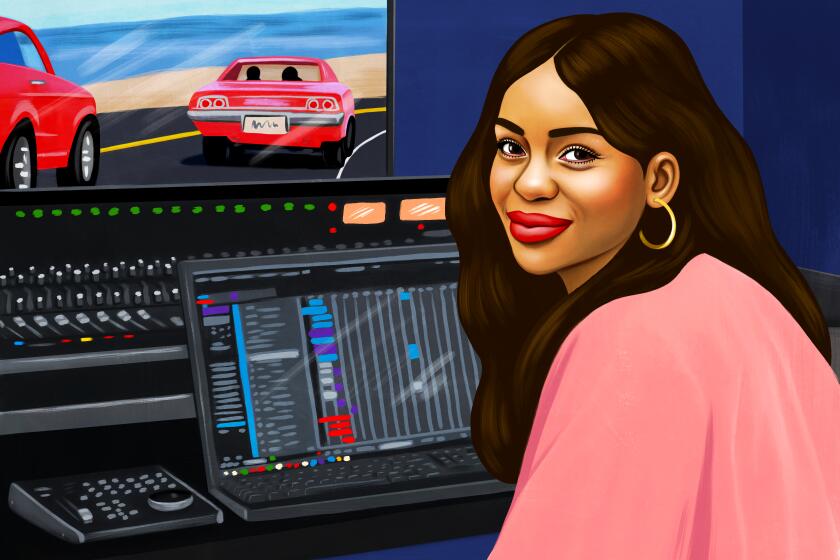Explaining Hollywood: How to get a job as a voice actor

- Share via
The explosion of content being developed for screens of all sizes has led to a burgeoning demand for actors — including ones who perform for a microphone, not a camera.
Long a fixture of commercials, kids’ cartoons and overdubbed videos, voice actors are now finding outlets in audiobooks, podcasts, serialized dramas, online educational materials, video games and animation for grown-up audiences. And as the opportunities have expanded, so has the number of people finding careers doing voiceovers.
Which is not to suggest that it’s easy to break into the field. As with anything in the entertainment industry, you’ll need skills and perseverance. Having an agent helps too.
The Times talked to Los Angeles-based voice actors Stephanie Beatriz, who works in film and TV; Chanté McCormick, who records audiobooks; Thomas Copeland Jr., who specializes in commercials; Joe Zieja, who’s worked in animation, games, corporate video and commercials; and Kathy Perkins (stage name Kathy Grable), who’s done a wide variety of voice gigs in addition to teaching the craft, as well as agent Jen Rudin, head of animation at ICM Partners in New York. Here are their pointers for how to break into and succeed in the business.
Who becomes a voice actor?
Narrating an audiobook, providing the voiceover for a video game, performing lines as an animated character and making a commercial pitch are markedly different pursuits that demand different skills. But one thing that seems common among voice actors in all these fields is a fertile and well-practiced imagination.
Take Beatriz, a theater actress who came to Los Angeles about a decade ago eager to do voice work alongside films and TV shows. Beatriz said her interest in voice acting dates back to her days as a child of two working parents in suburban Houston, when she and her younger sister spent a lot of time watching cartoons and animated movies.
“It wasn’t lost on me as a kid that the heroes of the stories [in live-action movies and TV shows] often didn’t look like me,” she said. “Animation was the one place where the heroes in the story sometimes didn’t look like anybody I knew because they were out of somebody else’s imagination. That world felt a little more accessible to me, somehow.”
Equipped with a portable Fisher-Price tape recorder, she and her sister would entertain themselves for hours by recording shows for fictional radio stations — doing mock interviews, commercials and songs in a variety of voices. That sort of mental world-conjuring is a key part of her work in front of a mic now when she’s doing voices for animation — notably, she’ll be the lead in Disney’s Thanksgiving offering, the musical fantasy “Encanto.”
Typically, she said, she’ll go into a session with the script and a couple of images, and “your mind gets to fill in the rest with whatever’s on the page. ... It’s so fun and so freeing.”
There’s true pleasure in seeing what the animators end up doing with “whatever weird thing that your face normally does” as you perform your lines, she said. Plus, “there’s a freedom in not having someone come and touch you up before your next take.”
Actors who have chosen to pursue Hollywood later in life as a second career share their experiences and advice.
Rudin offered a similar assessment. Typically, she said, each voice actor in a cast works individually, like a soloist before a conductor with no other members of the orchestra on stage. And the actors have a lot of blanks to fill in, performing not just the lines on the page but also the grunts, groans and all the other sounds coming out of their characters’ mouths as they move around the screen.
“You’ve got to have an imagination to do that,” Rudin said. “If you’re not the type of actor who likes to play around and have fun, it’s going to be torture for you. It’s going to be agony.”
Having some experience on stage or in front of a camera helps. Perkins, for example, says she did summer stock theater and a few national touring productions before moving to Los Angeles and taking up voice work.
“The person who has an acting background, that is going to give you a huge leg up” in the audiobook world, McCormick said. “How else would you know how to approach a book that has 60 characters in it if you’re not used to analyzing scripts?”
Copeland, who pursued careers as a rapper and an actor before finding a niche as a voice actor in commercials, said an acting background isn’t as important to the people hiring talent for advertisements. “They don’t care abut your acting resume unless you’re a celebrity,” he said.
Still, he said his own experience as an actor has been a plus. “It helped me understand scripts better, it gave me more of an edge,” he said. Understanding the script and “emotionally connecting with the words,” Copeland said, is vital “because that’s the key to marketing.”
How do you get started?
For voice actors, a common entry point is freelance gigs they find online through websites such as Voices.com, Voice123, Backstage or, for audiobooks, Amazon’s Audiobook Creation Exchange (ACX). But you can’t expect to land a job just because you have a voice like James Earl Jones.
Most of the professionals The Times interviewed said it’s wise to invest in some classes on voice acting before leaping into the scrum of applicants.
It’s a very tough field to succeed in, and connections are vital to getting started. Having a background in music and dance helps.
Copeland said he took a six-week course at a Burbank studio in voice acting for commercials that broke down how to understand a script, how to recognize what a client is looking for and other fundamental skills. A few days later, he said, he was hired for his first gig: recording an announcement for Disney Hall about what to do in case of an emergency.
McCormick studied theater in college and was aiming for a career in TV and film when she went to a seminar on audiobook narration hosted by the Screen Actors Guild-American Federation of Television and Radio Artists (SAG-AFTRA). Intrigued, she later took a five-day workshop with a veteran narrator to prepare her for the process of auditioning on Amazon’s ACX.
There’s no shortage of people, casting houses and recording studios offering voice instruction online; for an extensive directory of services in Los Angeles aimed at voice artists, consult the Voice Over Resource Guide.
A good first step, though, would be to check out the numerous Facebook groups that support voice actors. Those are fertile ground for making connections too. Ultimately, you want to take classes from people whose work you know, Perkins said.
McCormick also pointed to the webinars and guidance that the Audio Publishers Assn. offers to its members, and to the mentoring programs for voice actors that are popping up at some publishing houses, such as Penguin Random House.
One more option, Copeland said, is to scour YouTube for guidance. “You can get a college degree in voiceover from YouTube,” he said, adding, “You can get a degree in anything from YouTube.”
Zieja, a former military intelligence officer with no formal acting training, argued instead for the learn-by-doing approach.
“I hear a lot of people say, ‘Soon I’m going to be ready for my demo and then I’m going to be ready to audition,’” Zieja said. “Why would you wait until you’ve learned a bunch of stuff? Just go do. ... I would not have survived if I was, like, waiting for the right person to get the work for me.”
How do you build and sustain a career as a special-effects artist in the rapidly evolving entertainment industry? We asked experts for their advice.
To actually land a job, you’ll need to record a demo — typically a 60- to 90-second MP3 that compiles snippets of your script-reading talents. “It’s like your calling card, your resume. It’s everything you’ll need to get your foot in the door, or at least get you up to the window in the door,” Copeland explained.
As with classes, there are plenty of recording studios offering to help you make a demo. But the fees can run into the thousands of dollars, and Perkins said you’ll eventually want more than one demo so you can present different styles and skills to different employers — for example, a demo for commercials, another for animation, a third for audiobooks.
Alternatively, you can record a demo in a home studio. In fact, many gigs, particularly in the freelance world, require you to do your own recording — your client isn’t paying for studio time. But the gear required to produce broadcast-quality audio can cost thousands of dollars too.
You’ll need a high-quality microphone, as well as a computer and an adapter than converts the microphone’s analog signals into digital ones. Then you’ll need a way to isolate your recordings from the noise of the outside world; some newcomers set up in a closet and use the clothes there to minimize noise, while more established artists shell out hundreds or even thousands of dollars on a dedicated recording booth. Finally, if you’re working with an engineer and possibly a director in a remote studio, you’ll need a special kind of phone line or a program such as Source-Connect to transmit your audio feed without hiccups and glitches.
You don’t have to be a sound engineer, but you do have to know how to use digital recording and editing tools, even when you’re working with a remote engineer. “There’s nothing worse than them rolling their eyes at you when you don’t know how to copy and paste,” Zieja said. You’ll also have to make sure your recordings meet the technical and quality specifications set by the industry.
Nevertheless, the tools don’t make the performer. “Just because you have a beautiful sound booth,” Rudin said, “that doesn’t mean you’ll be qualified.”
The online freelance jobs boards invite voice actors to upload their profiles and demos so producers looking for talent can find them. You may have to pay for that service, however — for example, Voices.com lets you put your profile and samples on the site for free, but charges $500 a year to have the site match you automatically with freelance opportunities.
There’s a growing demand for people who can create sonic atmospheres for everything from a mobile phone app to a feature film. Here are some tips for how to get started.
What are the career paths?
Voice actors often establish themselves by doing a lot of freelance work, then shift into higher-paying gigs with major studios and larger advertisers.
“The low-hanging fruit is your corporate stuff, it’s your e-learning” voiceovers, Zieja said. “The corporate world is very, very undervalued [by voice actors] because it’s unsexy. Teaching somebody about semiconductors is unglamorous.” But for Zieja, it was the key to quitting his day job and eventually moving to Los Angeles to pursue voice work in animation and video games. He recounted a quip he often told people: “My corporate career supports my video game voice acting habit.”
Like their counterparts in front of a camera, voice actors can become directors and producers. And in the audiobook world, McCormick said, narrators who enjoy editing audio can become sound engineers for other voice actors.
There’s also coaching other voice actors, as Perkins does.
How do you make money? (And what kind of money?)
Earning a living from voice acting is no picnic.
“It’s like any gig in acting,” Perkins said. “You could have a good year, [then] you could have a year that’s ugh.” Fewer commercials are being run on national networks, she said, which means they’re far less lucrative for voice actors.
Major studios and advertisers have contracts with SAG-AFTRA that set a pay scale for the various types of jobs voice actors perform, including films and TV shows, commercials, video games, movie trailers and corporate videos. Typically, those pay an amount for the first use — for example, $429 for an audio commercial played just in Los Angeles — then smaller amounts for subsequent uses.
The extra payments (“residuals”) on a heavily used commercial that runs on national networks can be a gold mine. Copeland said a friend of his did the voice for an Orange Julius commercial. “It ran for so long, the residual checks that he got from it ended up paying for his house.”
On the other hand, “if a client posts a non-union project, they can kind of price it at whatever they want,” Copeland said. As a freelancer scouring for jobs online, he said, “you kind of have to swim through the crap to find the gold.”
Freelancers doing audiobooks on ACX may be offered a slice of the book sales instead of a fixed fee, McCormick said. But that model is generally reserved for books with iffy sales prospects, she said, adding, “If they know their book is going to sell, they’re not going to split the revenue with you. They’ll just pay you the fee.”
SAG-AFTRA has contracts with book publishers too, so union pay scales may apply there. “That doesn’t mean that you should always work for scale,” McCormick said; you should negotiate for a higher rate on jobs that require extra work, such as dialect training.
Having an agent can also open more doors, especially in Hollywood. Copeland said that when he signed with an agency that specialized in voiceovers for commercials, it elevated him into a higher stratum — “big opportunities, big stuff,” he said, such as national campaigns and television spots.
Guidance is crucial to starting a career in entertainment, and at some point you’ll need an agent. How and where can you find one who gets you?
Rudin said voice acting is like any other job in the entertainment industry. “Somebody has to open up a door for you.”
And even then, it can be tough to break in. Beatriz said that “if you’re a new artist, no one really wants to collaborate with you yet because they don’t know if you’re worth your salt. ... It was really my work on ‘Brooklyn Nine-Nine’ that allowed people to trust that I would be able to come in and perform.”
How is this career different than it was 10 or 25 years ago?
One huge change is the shift from recording studios to home studios, which has slashed the cost of production and opened the field to more voice actors. As it has done in many other industries, the internet has also been a boon to freelancers and part-timers, making it easier for them to find and attract gigs.
As the field has expanded, Perkins said, voice actors have become more focused on niches. “There used to be fewer people who did all of it,” she said. “Now, the L.A. market has become much more a market of specialists, not generalists.”
The companies that employ voice actors, meanwhile, are beginning to recognize the need to diversify their voices.
“All these industries, collectively, are starting to understand their impact on the world,” Beatriz said. “How that affects the arts is that there’s much more acknowledgment now, I believe, that the heroes in the storytelling that we’ve seen in television and film are often cast in one way, and the stars of those shows reflect those heroes — white, straight, cis[gender], heteronormative people. That’s changing.
“People want to see stories told by everyone. They want to see themselves as the heroes of these stories. The cool, amazing, incredible, hopeful thing I see happening in arts is that the characters that are the lead are more and more reflecting the people who fill up this world. All the kinds of people.”
Copeland agreed and said a similar shift was happening in the advertising world. The “announcer” voice that dominated in previous decades is out, replaced by a more conversational tone — “someone who’s talking to them like their best friend, like a neighbor.” The result, he said, is “creating more opportunities for different types of voices in general.”
What advice do pros always hear that is wrong?
Like many voice actors, Copeland decided to look into the field because he was told he had “a good voice.” And a distinctive, appealing voice can definitely be an asset.
But professionals agree that the quality of your voice is not the be-all and end-all. “It’s not about, ‘Do you have a pretty voice?’ It’s ‘Can you act?’ McCormick said. “This really is an acting job ... even if it’s nonfiction.”
At the same time, Copeland said, “Just because you’re an actor doesn’t mean you’re gonna be good at voiceover. They are very different in some ways. I would say, don’t go in overconfidently thinking you can do voiceover because you’ve been an actor for a certain amount of time.”
One other myth: “I think actors feel like you need to make a demo tape right away,” Rudin said, but “spending thousands of dollars on a demo when you’re just starting out is definitely not a way to be prudent in your spending. It takes practice.”
What’s some good advice?
- Audition “for everything you can tackle,” Zieja said. He said he’s auditioned well over 40,000 times in the last eight years, adding, “That’s how I figured out what I was good at.” Copeland agreed, saying he’s “doing 10 auditions a day now, consistently.” He added, “I believe that if you’re constantly working, always auditioning and taking classes, you’ll see success.”
- If you want to work in animation, Rudin said, “you have to watch as much animation as you can and ask yourself, ‘What’s the story that they’re telling? What emotions are they conveying with their voice?’ And look at their energy and pacing.”
- Listen to commercials and try to mimic what the voice actors do, Zieja and Copeland said. Copeland added that there are a number of websites, including Edge Studio and Voices.com, that offer free scripts that voice actors can practice on.
- Save enough of your earnings to cover six months of expenses, McCormick said. According to Zieja, having a cushion lets you be more selective about the jobs you take. He added, “You can only be as picky as your bank account allows you to be.”
Read more of The Times’ guide to working in Hollywood.
More to Read
Inside the business of entertainment
The Wide Shot brings you news, analysis and insights on everything from streaming wars to production — and what it all means for the future.
You may occasionally receive promotional content from the Los Angeles Times.
















